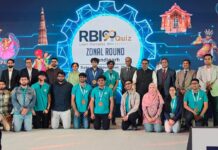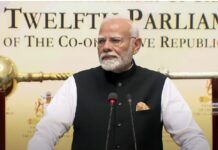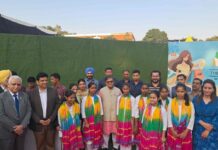DEPARTMENT OF PUBLIC RELATIONS PANJAB UNIVERSITY, CHANDIGARH
Chandigarh October 6, 2020
A seven day Faculty Development Programme (FDP) on ‘Artificial Intelligence in Human Life’ is being jointly organised by the Department of Computer Science and Applications and Human Resource Development Centre, Panjab University from 06 -12, October, 2020.
The program started with the introduction to the programme by Dr. Anuj Sharma, Coordinator of the programme. He talked about the importance of Artificial Intelligence in Human Life. He stressed that AI needs attention from various disciplines to solve real life problems and fulfill India’s AI initiative . He informed that the participants of the programme are from different disciplines like pharmaceutical sciences, law, mathematics, computer science etc.

Prof. Raj Kumar,Vice-Chancellor of Panjab University talked about the importance of AI for society. He stresses that a series of such programmes should be organized to give the future directions to the researchers. He said that the University should be aggressively involved in such initiatives. Panjab University’s approach to implementation of AI has to be guided by optimisation of all academic fraternity. The FDP “Artificial Intelligence in Human Life” will benefit to learn AI approaches, AI applications related to IT solutions and healthcare solutions, and understanding of AI outcomes in human life. The FDP in AI is focused on fundamental advances in AI technology, looking at problems through the lens of AI applications often reveal new opportunities for fundamental algorithmic advances with significant real-world impact. In AI for Healthcare, a fertile ground for the application of new ideas in advancement of healthcare systems. Particularly interested in applications of AI in the payer-provider space, optimizing healthcare delivery and outcomes. The AI for Social Good includes solving societal and humanitarian problems, such as economic inequality, hunger, poverty, social injustice, and disease. Finally, in AI research that looks at how automation can complement human skills through products, services, and innovative business models. The purpose of this faculty development programme is to lay the groundwork for evolving the National Strategy for Artificial Intelligence. This programme includes eminent speakers from Indian Statistical Institute, IITs, Microsoft Research, premier universities of India Including PU and NIT. As participants of this course are university and college teachers, it will be the most beneficial programme for their future research as AI needs attention of various disciplines now and not only computer science.

Prof. Sikander Kumar, Vice-Chancellor of Himachal Pradesh University was the chief guest for the inaugural session. Prof. Kumar talked in detail about the applications of Artificial Intelligence in various fields including manufacturing, healthcare, digitization etc. He talked about the techniques and technologies used in AI like Neural Networks, Machine Learning etc. He expressed happiness over the conduct of such a programme that is highlighting the current needs of the society.
Prof. R.K. Singla, Dean University Instructions talked about the theme of FDP. He stressed that the major reason behind the success of human beings is its ability to learn and infer from the surroundings. AI is emulating the same for machines. However, it can have positive as well as negative impacts on the human race.
Earlier, Dr. Rohini Sharma, Chairperson and co-coordinator of the programme highlighted the achievements of the department in placements and other activities. She shared that the department has been actively organizing webinars and faculty programmes in online mode during this pandemic.
Dr. S.K. Tomar, Director, Human Resource Development Centre, Panjab University shared that HRDC is actively involved in organizing the programmes for faculty. He said that the centre will organize more such programmes focusing on AI keeping in mind the overwhelming interest and response of the participants.
The session concluded with the Vote of Thanks delivered by Dr. Anuj Kumar, Assistant Professor.
The programme started on a very positive note with the hope that it will be quite beneficial for the participants and will contribute to the society.
As released by: Renuka B. Salwan (DPR)PU
















